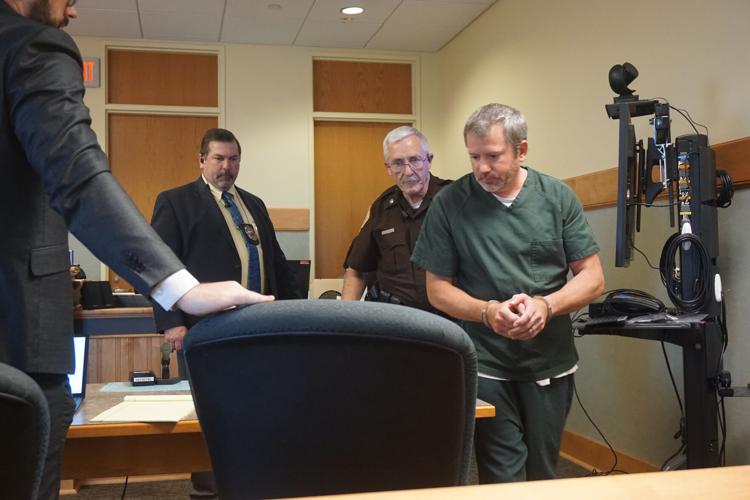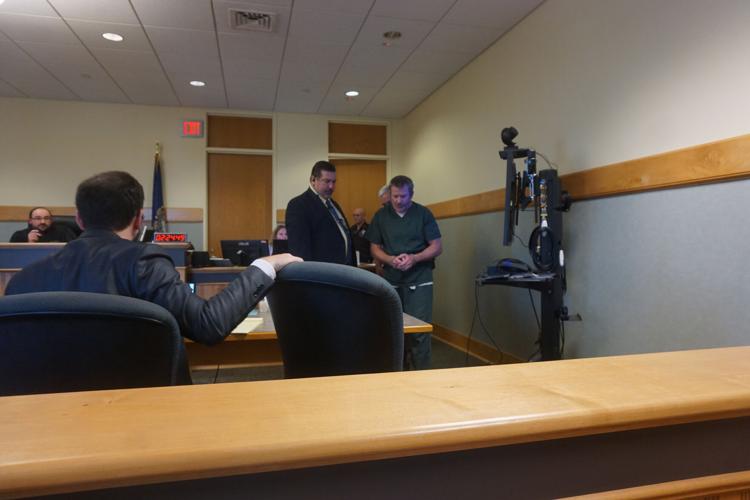Brian Horvath, accused of fatally shooting his brother in their parents’ home, will soon be returning to that property, where he will remain under house arrest to await proceedings in Belknap County Superior Court.
Horvath, 45, of Timber Lane in Gilford, was granted personal recognizance bail Wednesday afternoon in Laconia District Court following a probable cause hearing wherein Judge Ryan Guptill moved the case along to Belknap Superior Court.
New details of the alleged shooting on Sept. 6 emerged during the hearing Wednesday. Belknap County Attorney Keith Cormier asked that the hearing be sealed because the probable cause affidavit was itself under seal, but Guptill found that Horvath and the public had a constitutional right to a public proceeding.
Horvath appeared in person at the hearing — until that point he’d been lodged at Belknap County Jail without bail.
Cormier, who represented the state in its prosecution, called Gilford Police Department Cpl. Logan Tomasetti to testify. Tomasetti, under direct examination, provided a description of the sequence of events which were previously sealed to the public.
Horvath is accused of shooting his brother, David J. Horvath, 46, with a handgun on the night of Sept. 6. Tomasetti told the court he was working that night from 3 p.m. to 3 a.m. the following day, and responded to the single-family home to reports of a man wounded by a gunshot to the chest.
Tomasetti arrived, where both Horvath brothers apparently lived with their parents, along with Sgt. Douglas Wall and officer Angelo Papadopoulos after about three minutes of receiving the call at 9:46 p.m.
Upon his arrival, Tomasetti encountered Marsha Horvath and learned both brothers and their father, David Sr., were downstairs in a finished basement. Descending a staircase located to the left of the front door, Tomasetti told Cormier he came across the victim on the floor by a couch set along a wall and observed he’d suffered a wound to the chest, his face appeared blue and gray and he did not appear to be breathing. David Sr. was rending emergency aid to his wounded son.
The officer noted Brian was near the victim’s hip area and saw a black “glock-style” handgun on the ground and another blue or teal handgun he later learned was a Ruger. Tomasetti later learned the Ruger to be owned by Brian and the “glock-style” handgun was owned by David Jr. He rendered the “glock-style” handgun safe and heard David Sr. ask what had happened and “which one shot him?”
“The stupid little one that I have,” Brian replied and told the officer it had been an accident, according to Tomasetti's testimony.
Tomasetti told Cormier he observed signs of impairment at various points throughout the night in Brian, including slurred speech, stumbling and an appearance of bloodshot and glossy eyes.
At one point, Brian apparently told officers who responded to the call at their home that he was holding the gun when David Jr. was shot. He told officers the brothers were showing each other their guns when the incident occurred.
Tomasetti brought Brian and David Sr. upstairs to the main floor of the family’s home when emergency medical services arrived and they sat at a dining room table. At one point, while they were waiting upstairs, an EMT ascended the stairwell, met Tomasetti and explained David Jr. was pronounced deceased. Tomasetti remained with the family upstairs until superior officers from Gilford arrived. Capt. Dustin Parent asked Brian if he would voluntarily go to the police department to be interviewed. Brian agreed and Tomasetti transported him to the Gilford Police Department in his cruiser.
“He stumbled a few times,” Tomasetti told Cormier, noting Brian was not steady on his feet while walking on flat grass between the family home and his police cruiser. Brian rode unshackled in the back of the cruiser to the police department and exhibited mood swings on the way, ranging from cooperative and polite to angry and upset. Tomasetti testified Brian spoke with slurred speech and smelled of alcohol during the frisk before entering his cruiser.
“Those signs are all indicative of some sort of impairment,” Tomasetti said.
Upon arrival at the police station, Brian apparently opened the door for Tomasetti, but the officer noted he was not sure on his feet on his way to the building. Officers took Brian to interview room B, where he waited for over 90 minutes until State Police detectives arrived to investigate the circumstances of the shooting, Tomasetti said. At one point during that interview, Brian apparently told State Police he and his brother were showing each other their guns and he was in a nearby bathroom when he heard the gunshot.
He recanted that version of the story later on. When confronted by investigators, Brian told them he was holding the gun six or seven feet from David Jr. when he was wounded. He told investigators he had consumed 2.5 beers that night.
From the time Brian arrived at the police station, probably just before midnight according to Tomasetti, he waited about two hours before the interview began. He expressed interest in leaving the station, apparently frustrated with the amount of time he’d been waiting, but was dissuaded a few times from doing so. He stayed, ultimately, and the interview lasted between 90 minutes and two hours, ending sometime between 2:30 and 3 a.m.
“That’s how it came across to me,” Tomasetti said, noting Brian appeared to be upset with the amount of time he’d been waiting for the interview to begin.
Justin Littlefield, Brian’s public defender, noted to the judge that during Tomasetti's cross-examination the officer said he believed Brian was intoxicated but did not provide physical evidence to that effect. Further, he did not ask Brian if he’d sustained any injuries that could impair his balance and noted the officer did not know Brian personally and wouldn’t be able to say if he normally spoke with a unique pattern of speech.
“He obviously had just lost his brother as well,” Littlefield said.
Brian is charged with manslaughter, a special felony and reckless conduct with a deadly weapon, a class B felony. He was afforded personal recognizance bail and is ordered to follow a strict series of conditions, including abstaining from alcohol and drugs and is barred from possessing a firearm. He will also be electronically monitored, but is allowed to return to work.
“I found today that you don’t meet the requirements for preventive detention,” Guptill said.



















(0) comments
Welcome to the discussion.
Log In
Keep it Clean. Please avoid obscene, vulgar, lewd, racist or sexually-oriented language.
PLEASE TURN OFF YOUR CAPS LOCK.
Don't Threaten. Threats of harming another person will not be tolerated.
Be Truthful. Don't knowingly lie about anyone or anything.
Be Nice. No racism, sexism or any sort of -ism that is degrading to another person.
Be Proactive. Use the 'Report' link on each comment to let us know of abusive posts.
Share with Us. We'd love to hear eyewitness accounts, the history behind an article.